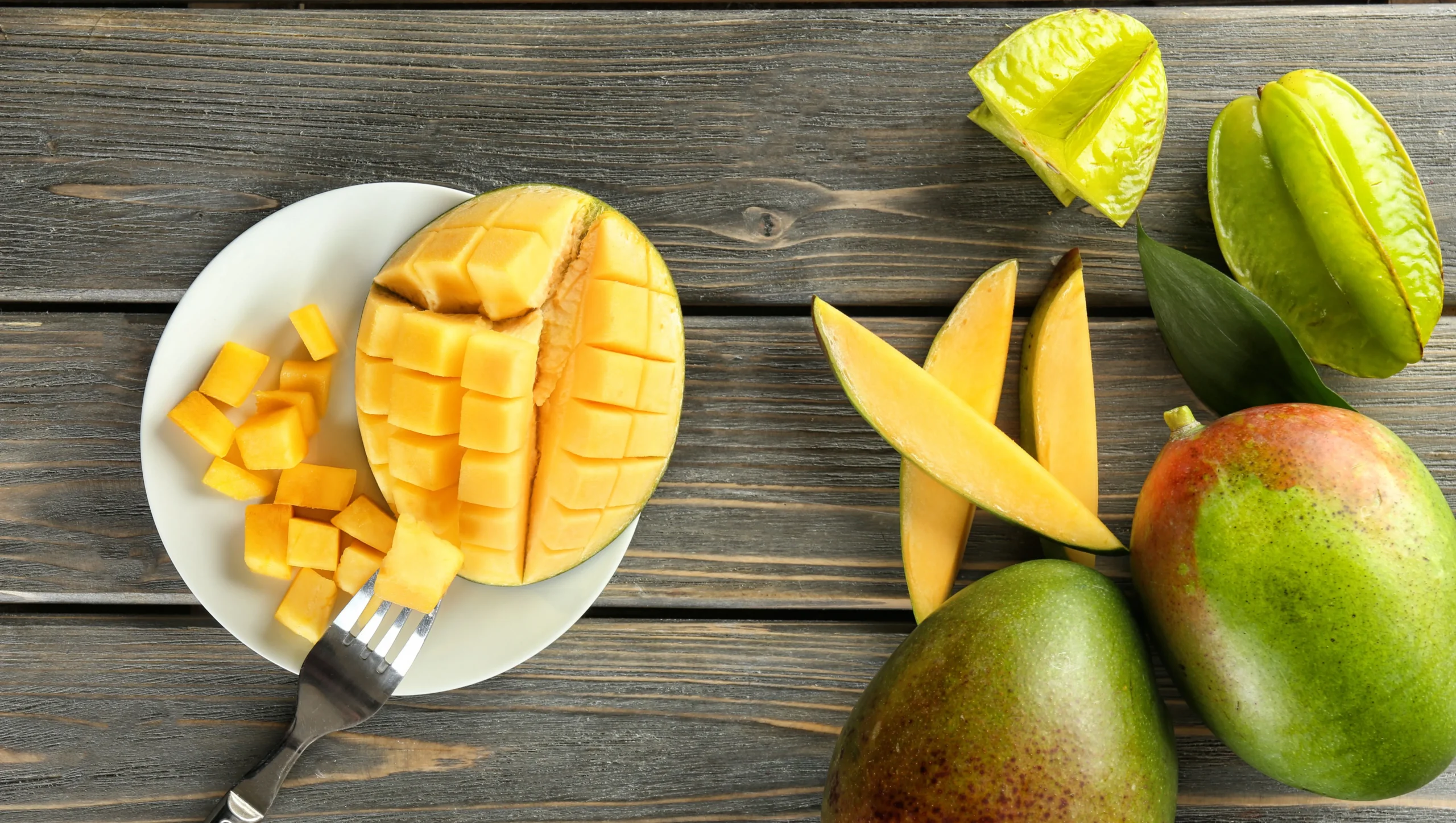Few fruits are as loved worldwide as the mango the “king of fruits.” Its golden flesh, tropical fragrance, and juicy sweetness make it irresistible. But if you’ve ever wondered, “Are mangoes acidic?” especially if you deal with acid reflux or a sensitive stomach then it’s time to uncover the truth.
Let’s dive deep into the acidity of mangoes, their pH levels, how they affect digestion, and whether they’re truly safe for acid-sensitive diets.
Understanding Fruit Acidity , What Does ‘Acidic’ Really Mean?
To understand whether mangoes are acidic, you first need to know what acidity means in the context of food.
The pH scale, which ranges from 0 (most acidic) to 14 (most alkaline), measures how acidic or basic a substance is. Foods with a pH below 7 are acidic, while those above 7 are alkaline.
However, fruit acidity isn’t always harmful. Many healthy foods, like oranges, tomatoes, and pineapples, are naturally acidic yet packed with vitamins and antioxidants.
Here’s a quick comparison:
| Fruit | pH Level | Acidity Level |
| Lemon | 2.0–2.6 | Highly acidic |
| Orange | 3.0–4.0 | Acidic |
| Pineapple | 3.2–4.0 | Acidic |
| Mango | 5.8–6.0 | Mildly acidic |
| Banana | 5.0–5.3 | Low acid |
| Watermelon | 5.5–6.0 | Low acid |
As you can see, mangoes sit close to the neutral zone, meaning they’re only mildly acidic and generally safe for most people.
The pH Level of Mangoes, Are Mangoes Acidic or Alkaline?
The pH level of mangoes typically falls between 5.8 and 6.0, depending on the variety and ripeness. This places them in the low-acid category.
Interestingly, mangoes contain organic acids like citric, malic, and tartaric acid, but these are present in very small amounts—especially once the fruit ripens.
| Mango Type | pH Range | Taste Profile | Acidity Level |
| Alphonso (India) | 5.8–6.0 | Sweet and creamy | Low |
| Ataulfo (Mexico) | 5.9–6.1 | Buttery and smooth | Low |
| Tommy Atkins (US) | 5.4–5.8 | Tart-sweet flavor | Mild |
| Green (Unripe) Mango | 4.8–5.3 | Tangy and sour | Moderate |
So, while mangoes are technically acidic, they’re far less so than citrus fruits. For most people, mangoes are gentle on the stomach and alkaline-forming after digestion, meaning they help balance body pH rather than disturb it.
Do Mangoes Cause Acid Reflux or Heartburn?
This is a common concern, especially for those with GERD (Gastroesophageal Reflux Disease) or acid reflux.
Here’s the good news: ripe mangoes rarely trigger acid reflux. The mild acidity of a ripe mango is balanced by its natural sugars, fiber, and enzymes that aid digestion.
However, problems may occur when:
- You eat unripe (green) mangoes—they’re more acidic.
- You consume large portions at once.
- You mix mangoes with spicy or oily foods.
- You eat them too close to bedtime.
Expert tip:
“Ripe mangoes tend to be less acidic and easier to digest. For those with acid reflux, eat mangoes in moderation and always when ripe.” Dr. Meera Patel, Nutrition Specialist
If you have a sensitive stomach, pair mangoes with yogurt, oatmeal, or almonds. These foods can help buffer acidity.
Are Ripe Mangoes Less Acidic Than Unripe Mangoes?
Absolutely. As mangoes ripen, their citric acid content decreases, while natural sugars like glucose and fructose rise. This change not only enhances sweetness but also lowers acidity.
| Stage | Citric Acid | Sugar Content | pH Level | Taste |
| Unripe Mango | High | Low | 4.8–5.3 | Sour & tangy |
| Ripe Mango | Low | High | 5.8–6.0 | Sweet & mild |
So, when choosing mangoes for an acid-sensitive diet, always go for fully ripe ones. Their gentle acidity and rich fiber make them easier to digest.
Health Benefits of Mangoes Despite Their Mild Acidity
Even though mangoes are slightly acidic, they’re incredibly nutritious and offer numerous health benefits. Each mango is loaded with:
- Vitamin C – boosts immunity and skin health
- Vitamin A – supports vision and repair
- Fiber – improves digestion and gut balance
- Antioxidants – combat inflammation and oxidative stress
Interestingly, mangoes are alkaline-forming once digested. The minerals (like potassium and magnesium) in mangoes help neutralize acid in your bloodstream, promoting better acid-base balance.
Fun fact: The body’s pH isn’t directly affected by what you eat, but an overall alkaline-forming diet rich in fruits and vegetables supports better digestion and health.
How to Eat Mangoes Safely If You Have Acid Reflux or GERD
If you’re prone to acid reflux, you can still enjoy mangoes just be smart about it.
Here are some simple tips:
Eat small portions (½ to 1 mango per serving).
Choose ripe, soft mangoes with a sweet aroma.
Avoid eating mangoes on an empty stomach.
Pair with alkaline foods like yogurt, nuts, or leafy greens.
Don’t combine with spicy or citrus foods.
Hydration tip: Drink water 30 minutes after eating mangoes to help neutralize stomach acid.
Other Fruits With Similar or Lower Acidity Levels
If you’re managing acid reflux or looking for low-acid fruits, here’s a comparison:
| Fruit | pH Level | Acidity Level |
| Mango | 5.8–6.0 | Mildly acidic |
| Banana | 5.0–5.3 | Low acid |
| Papaya | 5.5–6.5 | Low acid |
| Melon | 6.0–6.7 | Alkaline-forming |
| Fig | 5.0–5.9 | Low acid |
Mangoes fit right in with low-acid fruits that are gentle on digestion and suitable for acid reflux-friendly diets.
Common Myths About Mango Acidity , Busted
Let’s clear up a few misconceptions:
Myth 1: Mangoes always cause heartburn.
Fact: Only unripe mangoes are moderately acidic. Ripe mangoes are safe for most people.
Myth 2: All tropical fruits are highly acidic.
Fact: Mangoes, papayas, and bananas are low-acid fruits.
Myth 3: Acidic foods disrupt body pH.
Fact: Your body maintains a stable internal pH regardless of diet, but alkaline-forming foods like mangoes support better digestion and energy.
Final Thoughts: Are Mangoes Acidic or Alkaline Forming?
So, are mangoes acidic? Technically, yes slightly. But they’re one of the mildest acidic fruits and often alkaline-forming after digestion.
If you struggle with acid reflux, opt for ripe, sweet mangoes, enjoy them in moderation, and avoid pairing them with spicy or oily meals.
In short, mangoes aren’t your enemy they’re a nutrient-rich, stomach-friendly delight that can easily fit into a balanced, low-acid diet.
Frequently Asked Questions (FAQs)
- What is the exact pH of a mango?
The pH of ripe mangoes ranges between 5.8 and 6.0, making them mildly acidic. - Can eating mangoes cause stomach acidity?
Only if they’re unripe or consumed in large quantities. - Are dried mangoes more acidic?
Yes. Dried mangoes have concentrated sugars and acids, making them slightly more acidic. - How can I reduce the acidity of mangoes before eating them?
Eat them with yogurt or milk, or blend into a smoothie with alkaline foods. - Which mango variety is best for sensitive stomachs?
Ataulfo and Alphonso mangoes are low in acidity and high in sweetness ideal for sensitive digestion.

